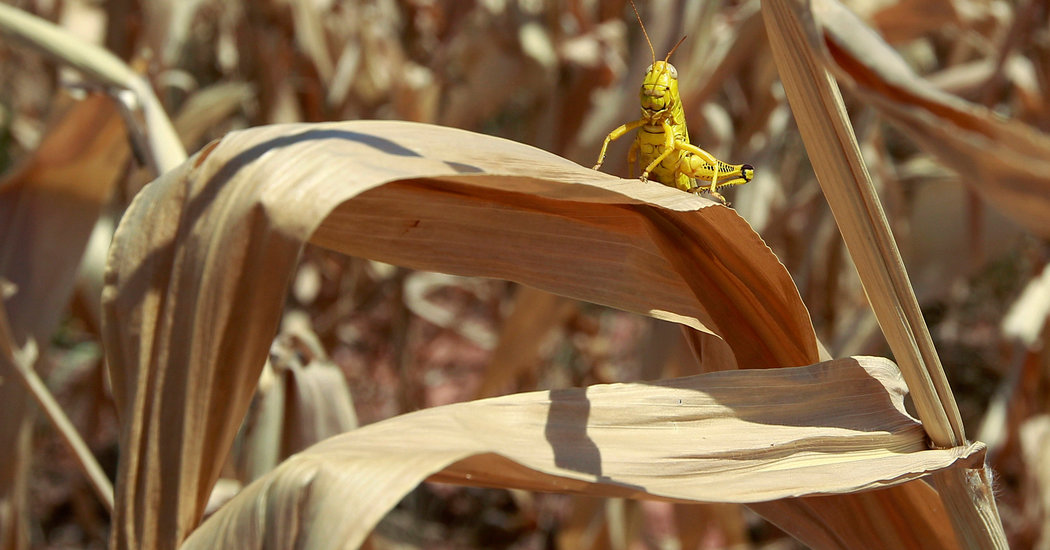
Within the Defense Department, one agency’s recent project sounds futuristic: millions of insects carrying viruses descend upon crops and then genetically modify them to withstand droughts, floods and foreign attacks, ensuring a permanently secure food supply.
But in a warning published Thursday in the journal Science, a group of independent scientists and lawyers objected to the research, which has not yet moved out of the lab. They argue that the endeavor is not so different from designing biological weapons — banned under international law since 1975 — that could swarm and destroy acres of crops.
The dispute is the latest episode in an ongoing international debate over the pursuit of what is called dual-use research: technological discoveries that can be beneficial or pose threats to human welfare. As gene-editing tools become increasingly accessible, scientists, ethicists and policymakers are weighing the good pivotal discoveries could do for humanity against their nefarious potential.
“Once you engineer a virus that spreads by insect, it is hard to imagine how you would ever control it,” said Guy Reeves, a researcher at the Max Planck Institute for Evolutionary Biology in Germany, who contributed to the critique.
“You haven’t just released a transmissible virus — you’ve released a disease,” he added. “The United States knows better than to return to a biological arms race.”
The Defense Advanced Research Projects Agency, or Darpa — which funds the research — responded to the critique with their own published rebuttal on Thursday.
“With any of these new technologies that are going to be revolutionary, there’s some inherent dual-use potential there,” said Blake Bextine, the research program’s manager, in an interview. “What we’ve done in this program is be very open.”
[Like the Science Times page on Facebook. | Sign up for the Science Times newsletter.]
Darpa launched the Insect Allies research program in 2016, budgeting $45 million over four years to transform agricultural pests into vectors that can transfer protective genes into plants within one growing season. That would be exponentially faster than modifying crops through a gene drive, which would breed specific traits into a species over several generations. (Gene drives have been proposed to reduce mosquito fertility, halting diseases like malaria.)
Researchers at four institutions — Boyce Thompson Institute in New York, Ohio State University, Pennsylvania State University and the University of Texas-Austin — have since been experimenting with the targeted gene therapy they hope will help farmers face issues like frost and disease.
But the critics said publishing the new research findings could establish “preliminary instruction manuals” for developing offensive biological weapons. Beyond strengthening crops’ resilience, insects could be easily engineered to carry viruses that destroy plants, Dr. Reeves said.
He added that one of the main species targeted in the research is maize, a staple source of nutrition for hundreds of millions of people in Latin America and Africa.
Foreign military programs are often “driven by perception of competitors’ activities,” the critics warn, and “the mere announcement of this program may motivate other countries to develop their own capabilities in this arena — indeed, it may have already done so.”
The scholars suggested enhancing pre-existing methods of crop protection, such as aerial spraying, but Darpa program executives consider those tools expensive and imprecise. They also said the critique mischaracterized their research by suggesting that these viruses would permanently modify a plant’s genome. That is not the case, Dr. Bextine said.
“If you see a drought coming, you can deploy the system to sustain a period of difficulty, and then go back to a natural state,” Dr. Bextine said. “We are developing tools that are futuristic, but they are based very much in reality. This is biology we understand very well.”
Darpa has included the Department of Agriculture, the Environmental Protection Agency, the Food and Drug Administration and other regulators throughout the project. It also requires researchers to include at least three kill switches, or emergency brakes, in their systems as a safety measure.
Dr. Reeves was not satisfied.
“I think this project was decided down one quiet corridor — an agency with intentionally little oversight that comes up with slightly crazy ideas — and top people in the Pentagon will be as shocked as I was,” he said.
Darpa officers conceded that their agency’s work often involves calculated risk. Still, they consider it core to their mission to consider the benefits.
“We’re glad people are asking questions,” Dr. Bextine said. “But food security is national security. It stabilizes our society.”



